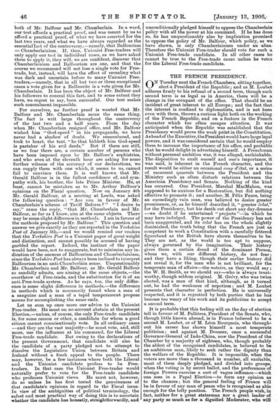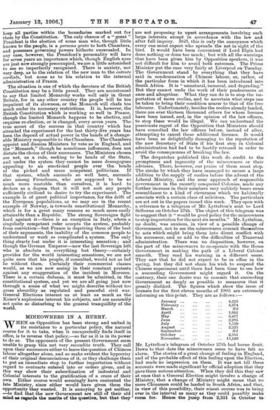THE FRENCH PRESIDENCY.
ON Tuesday next the French Chambers, sitting together, elect a President of the Republic ; and as M. Loubet adheres firmly to his refusal of a second term, though such second term is as legal as in America, there will be a change in the occupant of the office. That should be an incident of great interest to all Europe; and the fact that the interest is confined to diplomatists, and is not keen even with them, throws a curious light both on the working of the French Republic, and on a feature in the French character which too often escapes attention. It was anticipated when the Republic was established that the Presidency would prove the weak point in the Constitution. As head of the Executive, the President would have large legal powers, and it was considered certain that he would employ them to increase the importance of his office, and probable that he would delight in advertising himself. A Frenchman without personal ambition was, it was alleged, unthinkable. The disposition to exalt oneself and one's importance, it was said, is inherent in the French character, and the result would be either an occasional coup d'etat, or a series of recurrent quarrels between the President and the Ministry such as often disturb relations between the American Presidency and Senate. Nothing of the kind has occurred. One President, Marshal MacMahon, was supposed to be anxious for a Restoration, but did nothing effective to promote it; and another, M. Felix Faure, being an exceedingly vain man, was believed to desire greater prominence, or, as he himself described it, " greater éclat," for the Presidency, but his death cut short any day-dreams —we doubt if he entertained " projects "—in which he may have indulged. The power of the Presidency has not been exaggerated, and its éclat has on the whole slightly diminished, the truth being that the French are just as competent to work a Constitution with a carefully fettered figurehead as the British have shown themselves to be They are not, as the world is too apt to suppose, always governed by the imagination. Their history gives them a certain dread of the dominant Person, whom we, with our different history, do not fear ; and they have a liking, though their earlier history did not reveal it, for the man who is not brilliant, for the temperate man of affairs—the notaire, as they would say ; the W. H. Smith, as we should say—who is always trust- worthy, though seldom original. M. Gre'Ary, who was twice elected, was a man of that kind, although, as it turned out, he had the weakness of nepotism ; and M. Loubet presents that character in perfection. He is universally respected, and it is regretted by both parties that he has become too weary of his work and its publicities to accept a second term.
It is probable that this feeling will on the day of election tell in favour of M. Fallieres, President of the Senate, who though little known abroad, is in France believed to be a second M. Loubet, or of M. Leon Bourgeois, who through-1 out his career has shown himself a most temperate politician ; and against M. Doumer, once a successful Governor-General of Indo-China, now the President of the Chamber by a majority of eighteen, who, though probably the ablest of the recognised candidates, is believed to be an ambitious man, likely to seek rather the dignity than the welfare of the Republic. It is impossible, when the voters are more than a thousand in number, all excitable, most of them deeply pledged, and divided into groups; when the voting is by secret ballot, and the preferences of foreign Powers exercise a sort of vague influence—which one sees in a Papal Election—to form any opinion as to the chances ; but the general feeling of France will be in favour of any man of peace who is recognised as able enough for the lofty position. The French people wish, in fact, neither for a great statesman nor a great leader of any party so much as for- a dignified. Moderator, who will keep all parties within the 'boundaries marked out for them by the Constitution. The only chance of a " great " President is the election of some man who, though little known to the people, is a persona grata to both Chambers, and possesses governing powers hitherto unrevealed. In any case, however, the President's personality will have for seven years an importance which, though English eyes are just now strongly preoccupied, we are a little astonished to see so imperfectly recognised. There is anxiety, not very deep, as to the relation of the new man to the entente cordiale, but none as to his relation to the internal administration of France.
The situation is one of which the devotees of the British Constitution may be a little proud. They are accustomed. to say that limited Monarchy works well only in Great Britain, for in any other country the people will be too impatient of its slowness, or the Monarch will chafe too much under its necessary restrictions. It is, however, the British Constitution which is working so well in France, though the limited Monarch happens to be elective, and requires re-election, or is changed, every seven years. The true secret of the success iu that country which has attended the experiment for the last thirty-five years has been the deposit of actual power in the hands of a change- able Ministry responsible to the Chambers. The Chambers appoint and dismiss Ministers by vote as in England, and the "Monarch," though he sometimes influences, does not dictate the choice of their successors. The Ministers chosen are not, as a rule, seeking to be heads of the State, and under the system they cannot be mere demagogues appealing to an emotional people over the heads of the picked and more competent politicians. If that system, which succeeds so well here, succeeds also among Frenchmen, who are supposed to be so much more unstable than ourselves, it is hard to declare as a dogma that it will not suit any people sufficiently civilised to desire to try the experiment. The example is of great political importance, for the drift of the European populations, as we may see in the recent example of Norway, is towards constitutional Monarchy, which is for a great many reasons so much more easily attainable than a Republic. The strong Sovereigns fight hard against it—there is an exception in Italy, where a singularly competent ruler accepts the system, probably from conviction—but France is depriving them of the best of their arguments, the inability of the common people to understand or work so complicated a system. The only thing clearly lost under it is interesting sensation ; and though the German Emperor—now the last Sovereign left who is absolute in everything but theory—certainly provides for the world interesting sensations, we are not quite sure that his people, if consulted, would not as lief be without them. Certainly their commercial classes would, as we are now seeing in their constant protests against any exaggeration of the incident in Morocco. There is a certain dulness, it must be admitted, in the constitutional system, and yet we are all going just now through a scene of what we might describe without too gross absurdity as regulated and peaceful civil war. General Elections interest us at least as much as the Kaiser's explosions interest his subjects, and are assuredly not quite so disturbing to the general tranquillity of the world.











































 Previous page
Previous page